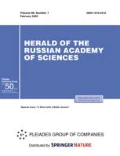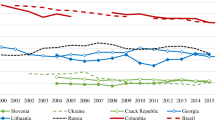Abstract
The results of a comprehensive sociological diagnostic analysis of the current state and dynamics of postreform Russian society and the social consequences of post-Soviet transformations, which began almost 30 years ago, are presented. The empirical basis of this paper is the data of numerous nationwide sociological studies, carried out by the Institute of Sociology, Federal Center of Theoretical and Applied Sociology, Russian Academy of Sciences, at crucial stages of societal reform, including the results of the nine waves of the all-Russia monitoring project of the Russian Science Foundation, The Dynamics of the Social Transformation of Modern Russia in the Socioeconomic, Political, Sociocultural, and Ethnoreligious Contexts (2014‒2018), and their comparative analysis. The social structure of modern Russian society is considered from the viewpoint of the stratification of respondents by income, the model of which divides the country’s population into three basic groups. The largest of them is the median one, demonstrating the average standard of living in today’s Russia. As a challenge to state socioeconomic policy, the presence of a significant stratum of low-income people is recorded, including the vulnerable and lower strata of the median population group.
The dynamics of the mass ideas of Russians about the causes of poverty and wealth in postreform Russian society is analyzed. The assessment of the level and quality of life of various population groups is provided considering the indicators of objective and subjective well-being/ill-being, based on Russians’ perception of current social reality. The conclusion is reached that the social results and consequences of the almost three decades of post-Soviet transformations have proved the inadequacy of the model of market reforms borrowed from the arsenal of Western theoretical thought, which is manifested, in particular, in the utmost understatement of the role of state participation in solving key socioeconomic and sociocultural problems. Hence, it is necessary to search for the answer to the question of how to improve the quality of state participation in society as a whole and in the economy in particular. It is proved that the determining factor of the inverse effect on the functioning and development of the economy is social relations; this supports the use of noneconomic, macrosocial indicators in the management process, which characterize the social condition of society in a specific historical period of its functioning and development. The analysis of social changes in Russian society is accompanied by the formulation of several postulates.



Similar content being viewed by others
Notes
This approach was used by scientists of the Institute of Sociology RAS FCTAS in 2014‒2018 in implementing the long-standing project of the Russian Science Foundation “The Dynamics of the Social Transformation of Modern Russia in the Socioeconomic, Political, Sociocultural, and Ethnoreligious Contexts.” Its results are presented in a five-volume series of monographs [1–5].
REFERENCES
Russian Society and Time Challenges: Book One, Ed. by M. K. Gorshkov and V. V. Petukhov (Ves’ Mir, Moscow, 2015) [in Russian].
Russian Society and Time Challenges: Book Two, Ed. by M. K. Gorshkov and V. V. Petukhov (Ves’ Mir, Moscow, 2015) [in Russian].
Russian Society and Time Challenges: Book Three, Ed. by M. K. Gorshkov and N. E. Tikhonova (Ves’ Mir, Moscow, 2016) [in Russian].
Russian Society and Time Challenges: Book Four, Ed. by M. K. Gorshkov and V. V. Petukhov (Ves’ Mir, Moscow, 2016) [in Russian].
Russian Society and Time Challenges: Book Five, Ed. by M. K. Gorshkov and V. V. Petukhov (Ves’ Mir, Moscow, 2017) [in Russian].
T. I. Zaslavskaya, Societal Transformation of Russian Society: The Structural Activity Concept (Delo, Moscow, 2002) [in Russian].
N. V. Tikhonova, Yu. P. Lezhnina, S. V. Mareeva, et al., The Income Stratification Model of Russian Society: Dynamics, Factors, Cross-Country Comparisons, Ed. by N. E. Tikhonova (Nestor-Istoriya, Moscow, 2018) [in Russian].
https://www.rbc.ru/economics/18/07/2019/5d3039e39a79476266abb143. Cited August 6, 2019.
Russia: A New Social Reality: The Rich, the Poor, the Middle Class, Ed. by M. K. Gorshkov and N. E. Tikhonova (Nauka, Moscow, 2004) [in Russian].
O. T. Bogomolov, “Neoliberalism: A modernization brake: Russian experience,” Ekon. Strategii 13 (5), 12–17 (2011).
Property and Business in the Life and Perception of Russians, Ed. by M. K. Gorshkov, N. E. Tikhonova, and A. Yu. Chepurenko (Nauka, Moscow, 2006) [in Russian].
And at the Crossroads Again? 30 Years of Post-Soviet Transformations …, Ed. by M. K. Gorshkov and G. A. Tosunyan (Novye Pechatnye Tekhnologii, Moscow, 2019) [in Russian].
Interethnic Harmony in the All-Russian and Regional Dimension: Sociocultural and Religious Contexts, Ed. by L.M. Drobizheva (FNISTs RAN, Moscow, 2018) [in Russian].
Author information
Authors and Affiliations
Corresponding author
Additional information
Translated by B. Alekseev
RAS Academician Mikhail Konstantinovich Gorshkov is Director of the RAS Federal Center of Theoretical and Applied Sociology (RAS FCTAS).
Rights and permissions
About this article
Cite this article
Gorshkov, M.K. Russian Society in the Sociological Dimension. Her. Russ. Acad. Sci. 90, 149–157 (2020). https://doi.org/10.1134/S1019331620020021
Received:
Revised:
Accepted:
Published:
Issue Date:
DOI: https://doi.org/10.1134/S1019331620020021




